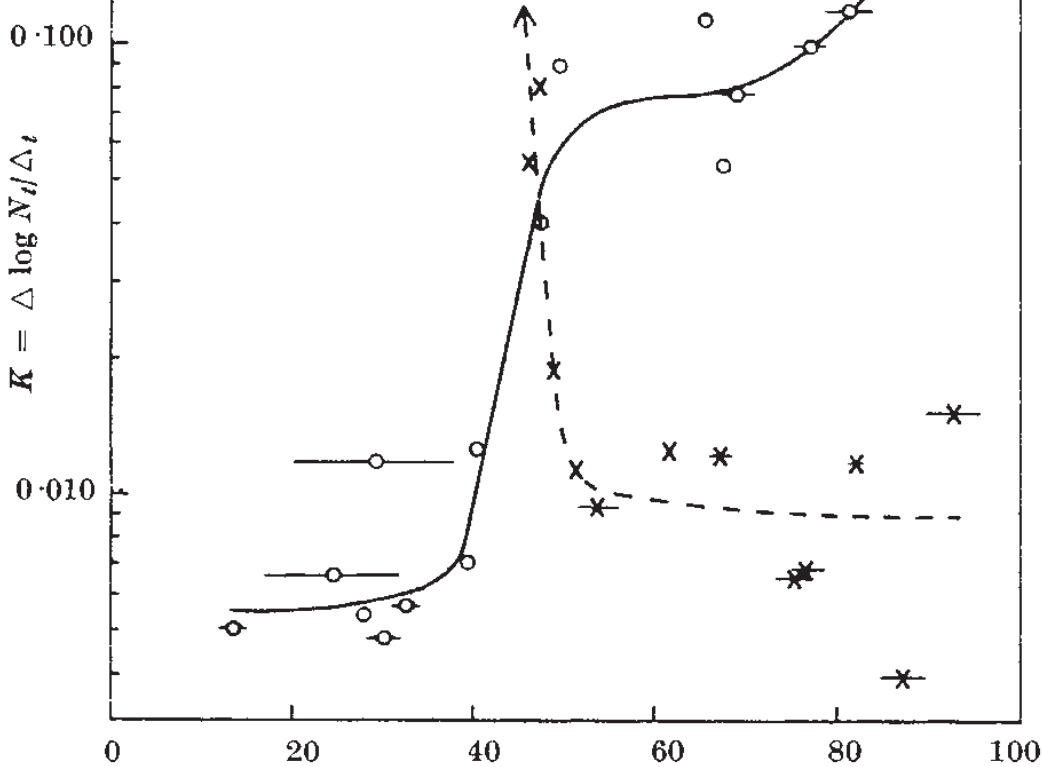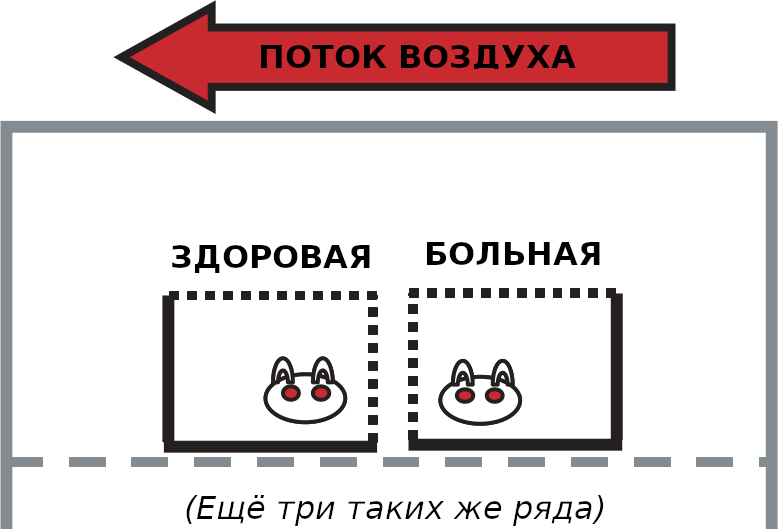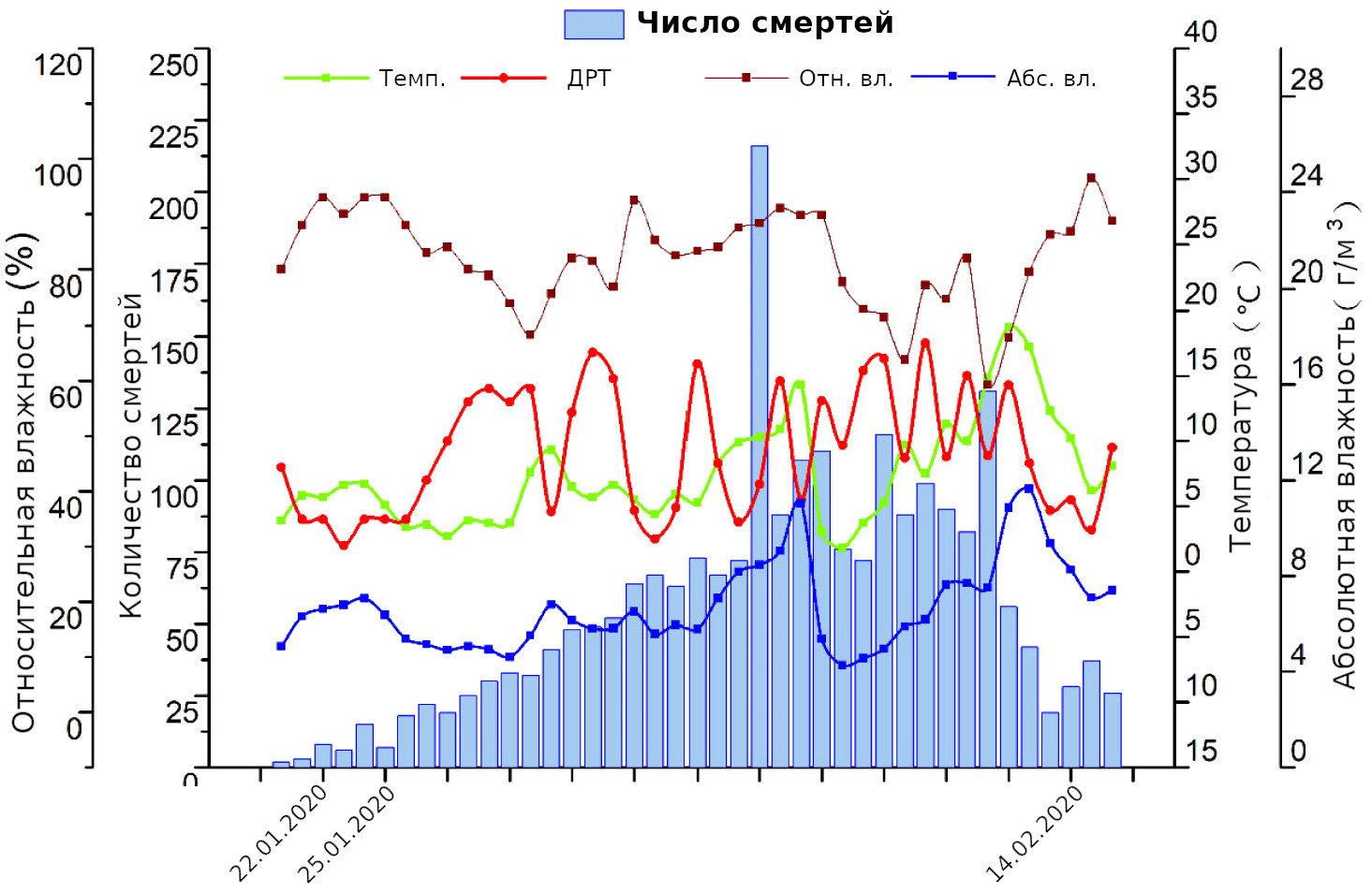Hemmes J. H.、etal。インフルエンザおよび多発性脊髄炎の季節的要因としてのウイルスの生存、Nature 1960、188:430-431。
実験によると、インフルエンザウイルスは空気中の低湿度で長持ちし、ポリオウイルスは高湿度で長持ちします。これは、冬に観察されたインフルエンザ活動および夏に観察されたポリオ活動と一致しています。記事の最初のグラフは、相対湿度(パーセント)に応じて、インフルエンザ(\(\ circ \))およびポリオミエリティス(\(\ times \))ウイルスの不活化(死亡)率を対数スケールで示しています。

Harper G. J. Airborne micro-organisms:4つのウイルスによる生存試験、Epidemiology&Infection、1961、59(4):479-486。
, , . . , — . , 64% 24 °C, — 3–4%.
Akers T. G., et al. Airborne stability of simian virus 40 ( SV40 ), Applied microbiology, 1973, 26(2):146–148.
, SV40 ( ). 21 °C ( 22% 88%). 32 °C (50–60%) .
Sohaffer F. L., et al. Survival of Airborne Influenza Virus: Effects of Propagating Host, Relative Humidity, and Composition of Spray Fluids ( : , ), Archives of Virology, 1976, 51(4):263–273.
, , , . , , .
Chew F. T., et al. Seasonal trends of viral respiratory tract infections in the tropics ( ), Epidemiology & Infection, 1998, 121(1):121–128.
1990 1994. - (), . (–) ( , –). , ́ . , . .
Lowen A. C., et al. Influenza Virus Transmission Is Dependent on Relative Humidity and Temperature ( ), PLoS Pathogens, 2007, 3(10):1470–1476.
, ( ) . 20 . 8 :

, , , , 5 °C, 20 °C. 30 °C .
20 °C 20%, 35%, 50%, 65% 80%. 20% 35% ( 3–4 4). 50% . 65% 3 4 , 80% — .
5 °C 50% 80% , 20 °C , .
. -, , . , , 3 . -, ( ). -, , ́ .
Lowen A. C., et al. High Temperature (30 °C) Blocks Aerosol but Not Contact Transmission of Influenza Virus ( (30 °C) , ), Journal of virology, 2008, 82(11):5650–5652.
, , 30 °C 20%, 50%, 65% 80%. .
Shaman J., et al. Absolute humidity modulates influenza survival, transmission, and seasonality ( , ), PNAS, 2009, 106(9):3243–3248
, , . , . , .
, . , . (\(p=0,048\) \(p=0,059\) ), (\(p=0,00027\)).
Shaman J., et al. Absolute Humidity and the Seasonal Onset of Influenza in the Continental United States ( ), PLoS Biology, 2010, 8(2):e1000316.
. , . , .
: , , , — , , , , .
Noti J. D. et al. High Humidity Leads to Loss of Infectious Influenza Virus from Simulated Coughs ( ), PLOS ONE, 2013, 8(2):e57485.
.
, . 4 , . 40% .
Kudo E., et al. Low ambient humidity impairs barrier function and innate resistance against influenza infection ( ), PNAS, 2019, 116(22):10905–10910.
, ( ), , .
Yueling Ma, et al. Effects of temperature variation and humidity on the death of COVID-19 in Wuhan, China ( -19 ), Science of the Total Environment, 2020, 724:138226.
-19 20 29 2020 . () -19:

Yu Wu, et al. Effects of temperature and humidity on the daily new cases and new deaths of COVID-19 in 166 countries ( -19 166 .), The Science of the total environment, 2020, 729:139051.
, . 1 °C 3.08%, 1.19%. 1 — 0,85% 0,51% .
Sajadi M. M., et al. Temperature, Humidity, and Latitude Analysis to Estimate Potential Spread and Seasonality of Coronavirus Disease 2019 (COVID-19) ( , -19), JAMA Network Open, 2020, 3(6):e2011834.
50 10 2020 . 8 -19 42 , -19. , 10 -19 10 2020 .
8 ( , , ́ , , , , , ) 30 ° 40 ° , : 5–11 °C, 4–7 \(\text{/}^3\).
, -19 .
Günther Th., et al. Investigation of a superspreading event preceding the largest meat processing plant-related SARS-Coronavirus 2 outbreak in Germany ( , -19 ), Social Science Research Network, 2020-07-23.
スケジュール、労働者の空間配置、気候条件と換気、輸送と生活条件が分析され、ウイルスのゲノムの完全な分析が行われた。感染の伝播は、空気が絶えず循環され、10℃に冷却されている密閉された部屋で発生することがわかった。従業員間のウイルスの伝播は、そのうちの1人から3営業日以内に行われました。ウイルスは8メートルの距離を伝わった。すべての従業員はマスクを着用し、距離を保つ必要がありました。